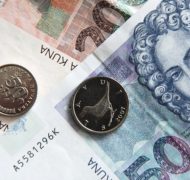Currency
Article / Produced by TOW Project
God enabled humans to represent material value in media that are durable, storable and transportable. In his original creation design God made some physical elements, such as gold, to be attractive, small, and relatively scarce. He also created in humans an ability to understand and impute value to such articles. Later, God allowed humans to establish governments which would use non-scarce resources, such as paper, to represent scarce resources, such as gold, which in turn could be exchanged for a wide variety of resources.[1] We have money which is in modern times very easy to transport (and is almost costless to transport electronically) and which provides access to real resources such as food, housing, education and capital goods. Being able to easily allocate resources via currencies is an important part of fulfilling the creation stewardship mandate.
The Bible contains much teaching about money. Several famous teachings are that “the love of money is a root of all kinds of evil” (1 Timothy 6:10) and, “You cannot serve both God and money” (Matthew 6:24). These teachings are not about money as a medium of exchange, but rather about human attitudes towards money and the power it represents to us. However, money as a medium of exchange is not the root of evil. Money as a medium of exchange is a blessing enabled by God.[2]
Some have argued that paper money which is not backed by gold is morally wrong. Exploring those arguments is beyond the scope of this article and would not inform the main points of this article.
Jacques Ellul, Money and Power (Inter-varsity Press, Downers Grove, 1984), argues that society’s way of thinking about money, wealth and resources is contrary to Biblical teaching. Although Ellul highlights the evil arising out of money, he is writing about wealth and material possessions, and not about currency as a medium of exchange.
Related Content
Related Content
Popular Content
Popular Content
Table of Contents
Donate
Copyright
Contributors: Leonard D. Van Drunen
Adopted by the Theology of Work Project Board February 6, 2014.
Theology of Work Project Online Materials by Theology of Work Project, Inc. is licensed under a Creative Commons Attribution-NonCommercial 4.0 International License. Based on a work at www.theologyofwork.org
You are free to share (to copy, distribute and transmit the work), and remix (to adapt the work) for non-commercial use only, under the condition that you must attribute the work to the Theology of Work Project, Inc., but not in any way that suggests that it endorses you or your use of the work.
© 2014 by the Theology of Work Project, Inc.
Unless otherwise noted, the Scripture quotations contained herein are from the New Revised Standard Version Bible, Copyright © 1989, Division of Christian Education of the National Council of the Churches of Christ in the U.S.A., and are used by permission. All rights reserved.







